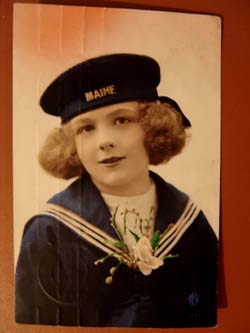 The weekend of Christmas we were visited by my friends Carl and Suzanne from Amsterdam. We had a nice dinner and some drinks and generally caught up on events since our visit to their place in May.
The weekend of Christmas we were visited by my friends Carl and Suzanne from Amsterdam. We had a nice dinner and some drinks and generally caught up on events since our visit to their place in May.
Carl found me a cool vintage postcard featuring a young girl wearing a sailor uniform. The interesting thing about this uniform is the hat which has the Word “Maine” on it signifying it as the uniform of a sailor on the USS Maine.
Why is that significant?
On February 15, 1898, a mysterious explosion destroyed the American battleship Maine in Havana Harbor and helped propel the United States into a war with Spain.
My great grandfather, Lt. John J. Blandin was the officer of the watch when the Maine blew up. The Spanish were blamed and we went to war.
In actuality the explosion was a malfunction. My great grandfather was the highest ranking officer to die as a result of that explosion and, as a result, has his name on the Maine memorial in Arlington National Cemetery.
His account of the explosion can be found here.
He died on July 9, 1898…about 5 months after the explosion.
His obituary is here.
Interestingly enough, the US NAVY convened a tribunal annually for 100 years to discuss the disaster.
On the 100th anniversary my aunt sent them the letter my great grandfather sent to his wife right after the explosion. They had never seen it. It caused quite a stir.
This is what it said…note the PS and PPS
SS City of Washington
Havana, Cuba, 1898
February 16
My darling,
You have read of our wreck, and I suppose Dr. Greer has informed you that I am all right. I was on watch when the explosion took place. A more complete and sudden wreck one can’t imagine. All of us left alive climbed onto the poop, and then looked around to see in anything could be done. We pulled out the wounded where we could. The wreck sunk and rested on the bottom, and was soon burning fiercely. When the Captain saw that nothing more could be done, he gave the order to abandon ship. We had two boats left that would float, and the Spanish man-of-war sent 5 boats, the steamer Washington sent 2 boats, and we got all who were alive into them, 80 men and officers were saved, out of 340. So we lost 260 men, or near that. About half of those saved are badly injured, and some will die. We all went to the American Steamship “City of Washington”, of the Ward Line, and were treated with every courtesy. I have just learned that we are to go to Key West this afternoon, and suppose I will get home soon.
 Two officers were lost, Jenkins and Merritt, both good friends of mine and fine fellows.
Two officers were lost, Jenkins and Merritt, both good friends of mine and fine fellows.
As for myself, I am uninjured. I lost everything except the clothes I have on. Tell Jack that I had a letter to him finished, but it was lost in the wreck.
Thank God, my darling that my life was spared again. Lots of love to my darlings from you own
Jack
P.S No one can tell what caused the explosion. I don’t believe the Spanish had anything to do with it.
Jack
P.P.S Don’t publish this letter.
The mention of his life being spared again was a reference to the wreck of the Trenton.
The thing that ties all this together for me is that is the widely believed notion that William Randolph Hearst’s New York Journal articles fueled the flames of war. The sensational journalism propelled us into a bloody conflict with Spain.
Newspapers sent hundreds of reporters, artists, and photographers south to recount Spanish atrocities. The correspondents, including such notables as author Stephen Crane and artist Frederick Remington, found little to report on when they arrived.
“There is no war,” Remington wrote to his boss. “Request to be recalled.”
Remington’s boss, William Randolph Hearst, sent a cable in reply:
“Please remain. You furnish the pictures, I’ll furnish the war.”
Hearst was true to his word.
For weeks after the Maine disaster, the Journal devoted more than eight pages a day to the story.
Not to be outdone, other papers followed Hearst’s lead. Hundreds of editorials demanded that the Maine and American honor be avenged. Many Americans agreed. Soon a rallying cry could be heard everywhere — in the papers, on the streets, and in the halls of Congress: “Remember the Maine! To hell with Spain.”
The Hearst corporation owns the Houston Chronicle. The very paper that publishes my column each week.
It’s just all so very odd when I stop and think about it.
I wonder if you might be interested in contacting the Sons of Spanish American War Veterans or Daughters of 98′ in regards to information on Lieutenant Blandin? With Maine Day coming up on February 15th, 2007, I know my South Carolina Camp and the New York Camp of the Sons of Span. Am. will be doing
Maine Day services in our respecitve cities.
Also if you or any of your family would be interested in joining the Sons of Spanish American War Veterans or the Daughters of 98′? If you would like to contact me please feel free to email me at Johnnyreb6@aol.com
Thank you for your time.
Kenneth H. Robison II,
Camp President, Micah J. Jenkins Camp No. 164, Sons of Spanish American War Veterans, Columbia, South Carolina.
Pingback:The Bald Heretic » Remembering the Maine
Lieutenant Blandin was my boyfriend’s great great grandfather. If you have any other information we would love to share with you.